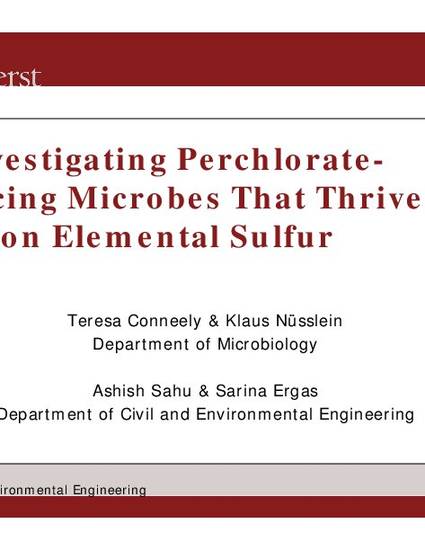
Bioremediation of perchlorate (ClO4-), a groundwater contaminant, is thought to be a cost-effective method of perchlorate treatment. This research investigated a novel enrichment culture using elemental sulfur pellets as the energy source for perchlorate reduction. Sulfur pellets are inexpensive and serve as an excellent packing material for both in-situ and ex-situ bioremediation. Use of sulfur as an electron donor has the additional advantage that autotrophic bacteria tend not to produce high levels of matrix-clogging biomass. The overall objective of this project was to investigate the microbial communities that thrive on elemental sulfur to develop a bioremediation processes. In both batch cultures and bioreactor systems, the microbial community could reduce both high (5 ppm) and low (100 ppb) ClO4- concentrations to less than 4 ppb. Samples from batch cultures and bioreactors were investigated using culture dependent and culture independent techniques. The composition of the batch culture community was examined using 16S rRNA gene sequence analysis, which identified close relatives from different classes of perchlorate-reducing bacteria (PRB). Detection of the gene for the chlorite dismutase enzyme (cld) further supported the presence of PRB. Culture samples indicated a dominant perchlorate-reducing strain most closely related to Dechloromonas sp. strain JM (a member of the beta-proteobacteria). Microscopic observation showed the cell morphology of a short rod shape, further supporting the similarity of this strain to Dechloromonas sp. Direct identification with fluorescently labeled gene probes specific to this organism confirmed its presence in both batch culture and bioreactor samples. Currently, a dilution to extinction strategy is being used to isolate this novel perchlorate-reducing strain and allow detailed characterization in pure culture. This research will expand the understanding of perchlorate reduction supported by autotrophic bacteria in contaminated aquifer systems.
Available at: http://works.bepress.com/klaus_nusslein/1/
